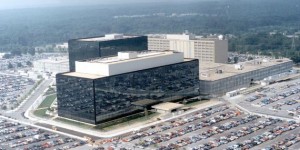
EDITORIAL – On Sunday, the Washington Post released a bombshell stemming from a four-month long investigation by The Post, finding that “ordinary Internet users, American and non-American alike, far outnumber legally targeted foreigners in the communications intercepted by the National Security Agency from U.S. digital networks.” The Post reviewed over 160,000 individual e-mail and instant message correspondence provided to them from NSA-leaker, turned fugitive Edward Snowden. The data provided by Snowden was obtained by the NSA, in authority granted from the 2008 amendments to the Foreign Intelligence Surveillance Act (FISA) by Congress. Top brass at the NSA has continually claimed Snowden did not have access to these closely guarded repositories of sensitive data. According to the NSA, this “incidentally” collected U.S.-born content is archived by the agency, even if it does not contain foreign intelligence.
Currently, the NSA purports they are solely-authorized to collect foreign intelligence data, though the agency claims they often inadvertently procure U.S. records. The trove of data obtained by The Post is the first intimate look at the type of information gathered and stored by the NSA, spanning the first term of the Obama presidency, roughly from 2009 to 2012. The Post reports that the NSA data ranges from “medical records sent from one family member to another, résumés from job hunters and academic transcripts of schoolchildren…In one photo, a young girl in religious dress beams at a camera outside a mosque. Scores of pictures show infants and toddlers in bathtubs, on swings, sprawled on their backs and kissed by their mothers. In some photos, men show off their physiques. In others, women model lingerie, leaning suggestively into a webcam or striking risqu[é] poses in shorts and bikini tops.” In essence, the U.S.-born web data is far from a ‘gold mine’ of useful and functional intelligence.
In a sort of defense of the NSA, frankly, it is a relic. An agency rooted in a need to collect signals intelligence, or more commonly referred to by the abbreviation SIGINT, against an inferior military superpower—the Soviet Union. The ‘spy game’ itself has changed drastically in the post-Soviet era. The technologically second-rate USSR was an easily discernable and more pronounced target than small terrorist cells operating in far-flung places across the globe. To reinforce the analogy, the NSA could more easily track troop movements in the Soviet-Afghan War and nuclear missile sites in an isolated Soviet Socialist Republic in central Asia via 1980s satellite technology, than monitor a single, often unknown, radical anti-western, anti-American terrorist cell operating in the most remote places in the world. Further, a terrorist could more easily and effectively, with relatively cheap technology (compared to high-tech Soviet nuclear weapons systems), hastily string together a dirty bomb or other incendiary device and unleash it on a populated U.S. urban center. We no longer live in a world where monitoring for a potential global-thermonuclear doomsday is a deep concern for U.S. federal policymakers and analysts. Poignantly, we no longer live in a time where it is two or three “minutes to midnight.”
According to The Post, both of the NSA’s top surveillance programs, PRISM and Upstream, have led to “fresh revelations about a secret overseas nuclear project, double-dealing by an ostensible ally, a military calamity that befell an unfriendly power, and the identities of aggressive intruders into U.S. computer networks.” Admittedly, the dichotomy between security and privacy is a fine one. Proponents of both PRISM and Upstream will frequently hail its successes—successes that are consigned behind a veil of secrecy. It is not the opinion of this author that state secrets should be completely in the open for the world to know. For instance, without the upmost confidentiality, the raid against Osama bin Laden’s compound in May 2011 would’ve almost certainly been foiled. But with too little transparency, the double-edged sword of state secrets is that the state becomes endowed with substantial power, and the real potential to wield that power in order to abuse or manipulate the body politic. With too little transparency, we’re left with a political directorate invading foreign nation-states in search of illusive weapons of mass destruction, or making unfounded connections between dictators and terror cells in order to encroach on sovereign territory. This story should sound very familiar to each and every American.
Prior to the revelations over PRISM, Upstream, and the NSA’s reliance on U.S.-born incidental surveillance data, Jim Clapper, director of national intelligence, testified before the U.S. Senate Select Committee on Intelligence. Clapper was questioned by Sen. Ron Wyden (D-OR), a vigilant watchmen against the rise of an abusive surveillance state, as to whether NSA was collecting “any type of data at all on millions or hundreds of millions of Americans”—to which Clapper replied “No, sir … not wittingly.” Consequently, a bipartisan group in the House of Representatives has called for Jim Clapper to be fired from his capacity as national intelligence director for lying under oath to the Congress. Sen. Wyden brilliantly baited Clapper into a lie during the open hearing. If Clapper would’ve told the truth, the public would’ve come to know that a massive electronic surveillance program existed; if he would’ve asked to discuss the issue in a closed or sealed intelligence hearing and simply not say ‘no,’ the public would’ve known that something was happening behind closed doors, as well. Thus Clapper took the bait and lied before Congress, to a stunned Wyden.
The problem with our nation’s intelligence agencies, like many other sub-executive departments, is the false notion they harbor that there is an ‘independent bureaucracy’ in this country. Admittedly, nowhere is this fundamental lack of understanding of role and purpose more pronounced than in the clandestine services. Congress, the people’s representatives to the federal government, enact laws. These laws are carried out, or “executed,” by the executive branch of government, to which CIA, FBI, NSA, and the like belong. Often, the Congress reviews federal laws and the ways which they are carried out by the executive in the hopes of crafting more effective legislation. In this process, congressional leaders often call heads of various federal and state agencies before their committees to gain a better understanding of the implementation of federal law, in order to make appropriate modification. When Jim Clapper lied to Sen. Wyden, it was not merely a “little white lie,” but a key bureaucratic functionary willingly and knowingly subverting the will and power of the Congress—the people’s representatives. This should not be taken lightly in representative democracy.
In January 1975, the intelligence community had grown largely independent of both the president and the Congress. Thus, under the leadership of Sen. Frank Church (D-ID), congressional leaders formed the U.S. Senate Select Committee to Study Governmental Operations with Respect to Intelligence Activities, commonly referred to as simply, the Church Committee. For instance, the most damning revelations discovered by the Church Committee were that the FBI was opening and photographing over 200,000 pieces of mail; further, the committee discovered that there was an assassination attempt on Cuban dictator Fidel Castro by the Sicilian mafia; and finally, the U.S Army exhibited a concerted effort to conduct domestic U.S. spying. The Church Committee sent a message to the intelligence community: you are not above the law—you’re yet another bureaucratic arm of the executive and thus you must rightly succumb to the scrutiny of the Congress.
Today, more than ever, a new Church Committee would do immense good in reining in domestic surveillance. I have previously spoken of the dangers of the modern surveillance state. The PRISM program is a classic example of Jeremy Bentham’s panopticon. The panopticon is a dehumanizing architectural schema for a penal institution where all inmates can be observed from a central observation post. None of the inmates know whether they’re being observed and, in turn, modify their behavior accordingly—due simply to the possibility of observation. In civil society, the government does not have the resources to monitor each of us, though the possibility exists that they may do so at any time—and none would be the wiser. This is the basic nature of the panopticon surveillance state.
I am not contending that those who work in the clandestine service have nefarious or almost Orwellian goals. Quite the contrary, those who work in the intelligence community have among the most consequential jobs in the federal bureaucracy—ensuring all of us are safe from harm. Though, we must always be vigilant to ensure the fine line between security and personal privacy is never violated. When the personal rights of Americans are violated, we must first ask how can we ensure this doesn’t happen again and second, were the actions of the individuals involved illegal?
Unequivocally, I call on President Obama to initiate a new era of leadership at NSA, CIA, and FBI. With Clapper lying to Congress, one can only ponder what else he could potentially be concealing from the people’s representatives. The Congress must examine these new revelations regarding the gathering of incidental data and ask: when did NSA leadership know, were they complicit in the violation of their institutional mission (i.e., foreign surveillance), were any laws broken, and do any actions constitute penal or criminal violations. Broadly, an individual can be charged in federal court for violating another’s civil rights. If government actors knowingly and willingly infringe upon an individual’s right to privacy and, in turn, violate the civil rights of American citizens, they should be held accountable as well—rightly, even more so.
Americans do not trust government. When revelations of massive domestic surveillance surface, this only reinforces the issue of public trust in government; assertive leadership is needed. That means leadership to reexamine our nation’s surveillance programs and the directorate which administers them. For anything else is an equivocation on those values our nation holds most dearly, those values which are codified in our federal constitution, and those values which are endowed upon every man by our creator. And that is not something Jim Clapper or any other man should take lightly.











